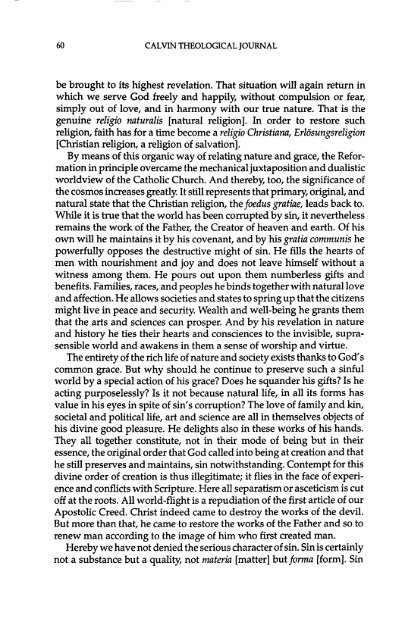Herman-Bavinck-Common-Grace
Create successful ePaper yourself
Turn your PDF publications into a flip-book with our unique Google optimized e-Paper software.
60 CALVIN THEOLOGICAL JOURNAL<br />
be brought to its highest revelation. That situation will again return in<br />
which we serve God freely and happily, without compulsion or fear,<br />
simply out of love, and in harmony with our true nature. That is the<br />
genuine religio naturalis [natural religion]. In order to restore such<br />
religion, faith has for a time become a religio Christiana, Erlösungsreligion<br />
[Christian religion, a religion of salvation].<br />
By means of this organic way of relating nature and grace, the Reformation<br />
in principle overcame the mechanical juxtaposition and dualistic<br />
worldview of the Catholic Church. And thereby, too, the significance of<br />
the cosmos increases greatly. It still represents that primary, original, and<br />
natural state that the Christian religion, the foedus gratiae, leads back to.<br />
While it is true that the world has been corrupted by sin, it nevertheless<br />
remains the work of the Father, the Creator of heaven and earth. Of his<br />
own will he maintains it by his covenant, and by his gratia communis he<br />
powerfully opposes the destructive might of sin. He fills the hearts of<br />
men with nourishment and joy and does not leave himself without a<br />
witness among them. He pours out upon them numberless gifts and<br />
benefits. Families, races, and peoples he binds together with natural love<br />
and affection. He allows societies and states to spring up that the citizens<br />
might live in peace and security. Wealth and well-being he grants them<br />
that the arts and sciences can prosper. And by his revelation in nature<br />
and history he ties their hearts and consciences to the invisible, suprasensible<br />
world and awakens in them a sense of worship and virtue.<br />
The entirety of the rich life of nature and society exists thanks to God's<br />
common grace. But why should he continue to preserve such a sinful<br />
world by a special action of his grace? Does he squander his gifts? Is he<br />
acting purposelessly? Is it not because natural life, in all its forms has<br />
value in his eyes in spite of sin's corruption? The love of family and kin,<br />
societal and political life, art and science are all in themselves objects of<br />
his divine good pleasure. He delights also in these works of his hands.<br />
They all together constitute, not in their mode of being but in their<br />
essence, the original order that God called into being at creation and that<br />
he still preserves and maintains, sin notwithstanding. Contempt for this<br />
divine order of creation is thus illegitimate; it flies in the face of experience<br />
and conflicts with Scripture. Here all separatism or asceticism is cut<br />
off at the roots. All world-flight is a repudiation of the first article of our<br />
Apostolic Creed. Christ indeed came to destroy the works of the devil.<br />
But more than that, he came to restore the works of the Father and so to<br />
renew man according to the image of him who first created man.<br />
Hereby we have not denied the serious character of sin. Sin is certainly<br />
not a substance but a quality, not materia [matter] but forma [form]. Sin



